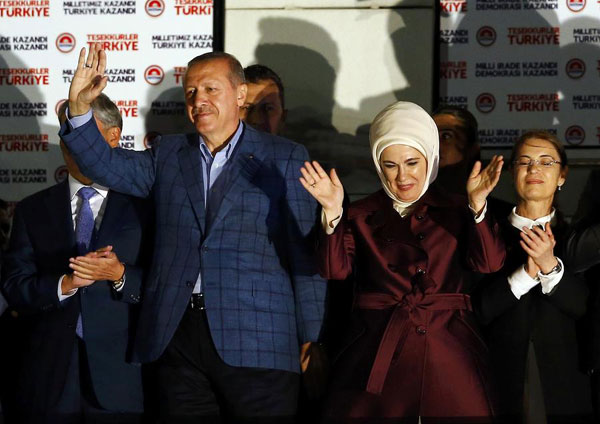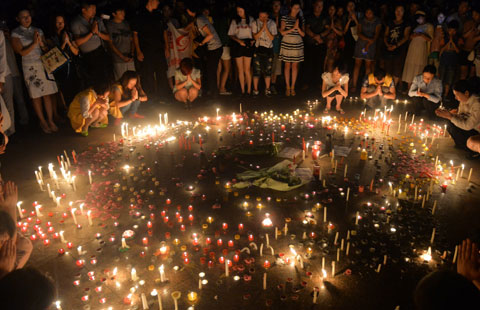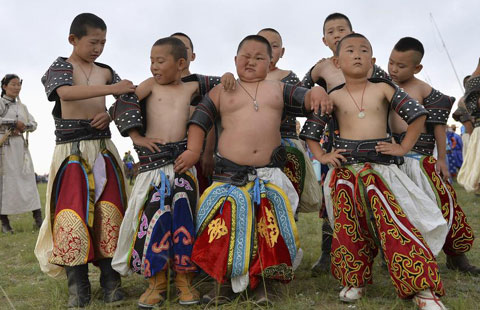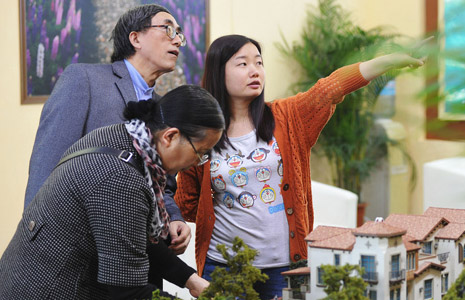Turkish PM set to win 1st direct presidential election
Updated: 2014-08-11 08:04
(Xinhua)
|
|||||||||||
ANKARA - Presidential hopeful and Prime Minister Recep Tayyip Erdogan is set to become Turkey's first popularly-elected president after unofficial ballot counting credited him with more than half the vote, local media said on Sunday.
|
 |
| Turkey's Prime Minister Tayyip Erdogan celebrates his election victory next to wife Ermine in front of the party headquarters in Ankara August 10, 2014. [Photo/Agencies] |
Erdogan, head of Turkey's ruling Justice and Development Party (AKP), led Sunday's presidential polls with 51.8 percent of votes, according to the local NTV. Turkey's election law says any candidate winning more than half the vote claims an outright victory in the presidential race.
The prime minister's two opponents were Republican People's Party's (CHP) and the Nationalist Movement Party's (MHP) joint candidate Ekmeleddin Ihsanoglu, who received 38.5 percent of the votes, and People's Democratic Party's (HDP) candidate Selahattin Demirtas, who collected 9.8 percent of the votes, NTV said, while voting turnout stood at 73 percent, below expectations, according to the semi-official Anatolia news agency.
After voting results were revealed, Ihsanoglu, Erdogan's major rival, welcomed the election result, saying the nearly 40-percent support he received was a "very significant figure."
"It is an answer to those who said a month ago, when we first started our election campaign, that nobody even knows Ihsanoglu," he said. "I want to express my gratitude for those who supported me, all the political parties and the army of volunteers," he added, also congratulating the prime minister on his victory.
In addition to Turkey's economic boom and a wide-scale welfare system established during his years as prime minister, Erdogan's victory may also be largely attributed to his energetic and aggressive election campaign. But he has been strongly criticized for exploiting his prime minister office and other public resources for a much more intensive media exposure and campaign activities than his opponents did.
According to the Organization for Security and Cooperation in Europe, Turkey was criticized due to the government pressure on media and an unfair presidential competition that other candidates have faced when contesting Prime Minister Erdogan.
Late Sunday night Erdogan flew from Istanbul, where he cast his vote, to the capital Ankara to deliver his victorious "balcony speech" at the APK headquarters, a tradition observed after his winning in numerous elections previously.
In addition to his gratitude to all voters, either pro or against him, Erdogan devoted a large part of his speech to what he called a "New Turkey," where he has previously made it clear that he would push for a reshape of the country's political system, including a switch of regime from the current parliamentary to a strong presidential model.
Unlike his predecessors who only played ceremonial heads of state, Erdogan has looked to exercise full powers that current laws grant him. But for that end a change of the current constitution becomes a must, for which, however, his ruling AKP has so far neither gathered enough parliament seats to push through a law nor reached a common consensus within the party itself.
As Turkey enters probably another 10 years of Erdogan era, the president-elect is now eyeing two five-year terms until 2023, the 100th anniversary of the founding of the secular Turkish republic.
Related Stories
Election seen as pivotal for Turkey's future 2014-08-08 08:18
Erdogan dominates Turkey's presidential race 2014-08-04 15:45
Enchanting Urumqi leaves an impression in Turkey 2014-07-29 16:18
Turkey opposes Kurdish split from Iraq 2014-07-02 07:54
Turkey sentences 1980 coup leaders to life in jail 2014-06-18 20:10
Two protesters killed in clashes with security force in Turkey 2014-06-08 17:09
Today's Top News
CRC pulls plug on gearboxes made by Voith
UK launches 24-hour visa service in China
Chinese medics reach Sierra Leone
Thailand waives visa fees for Chinese tourists
Sino-Japanese ties at a '40-year low'
Yingluck returns to Thailand
Turkish PM wins direct presidential election
Anti-graft targets Chinese emigrants
Hot Topics
Lunar probe , China growth forecasts, Emission rules get tougher, China seen through 'colored lens', International board,
Editor's Picks

|

|

|

|

|

|





